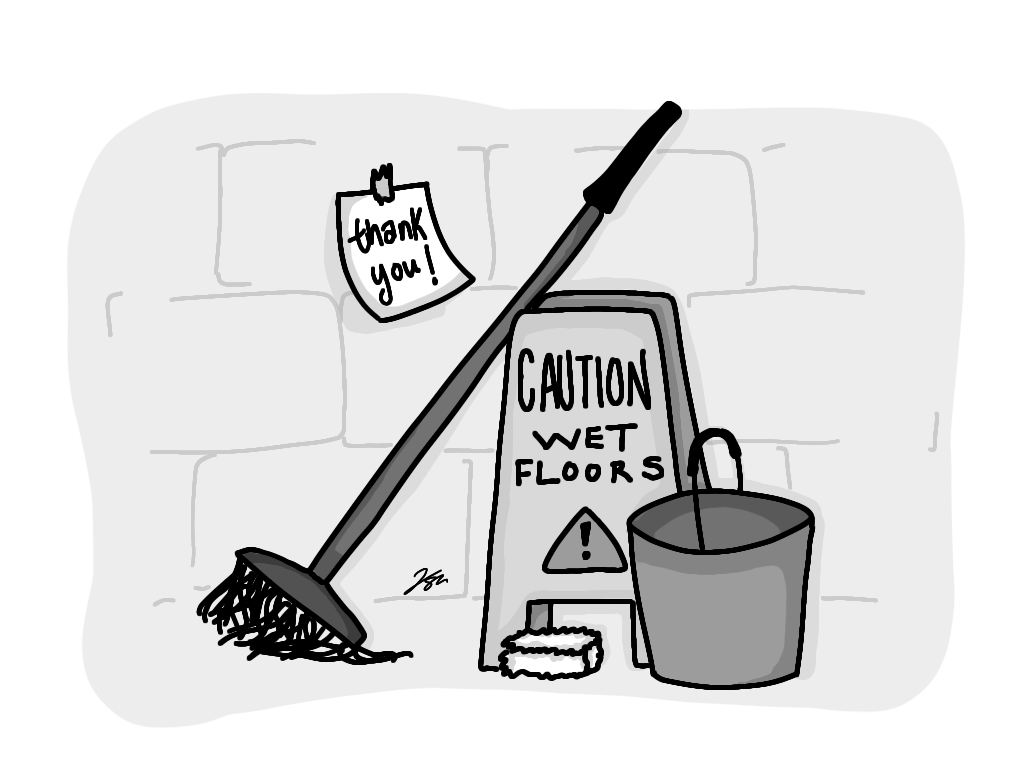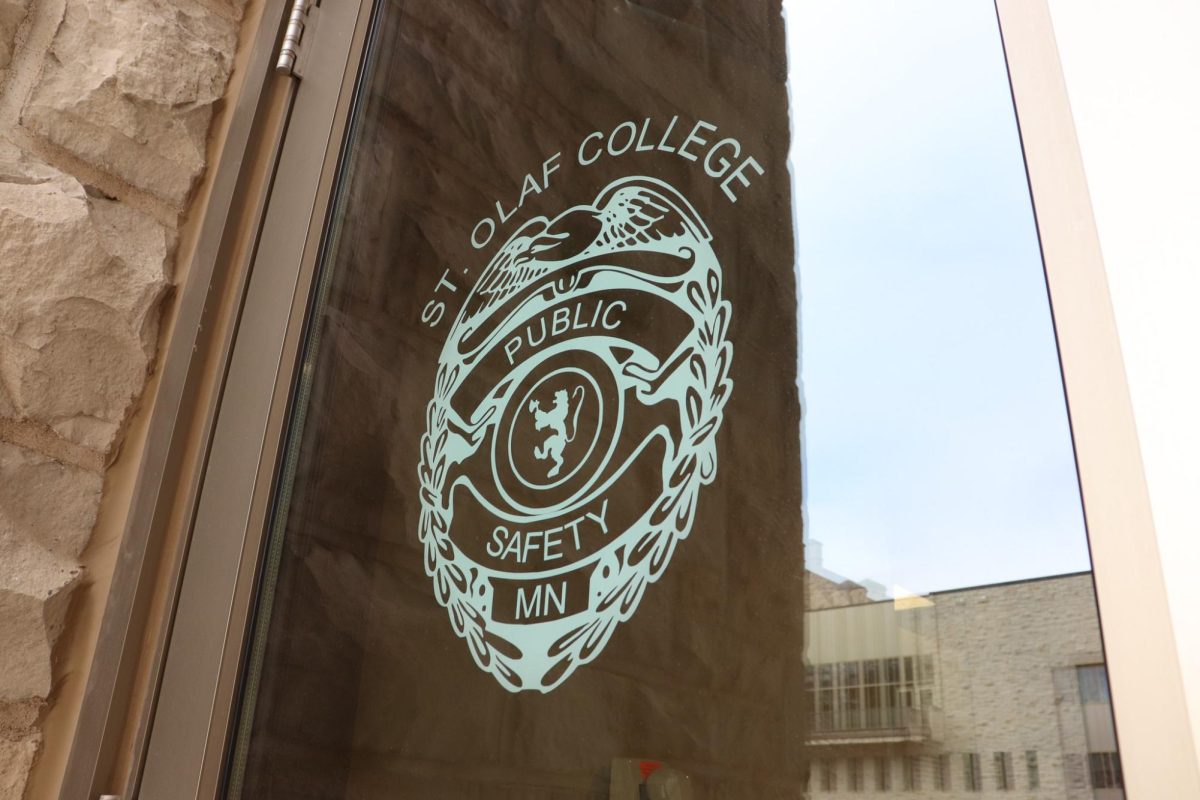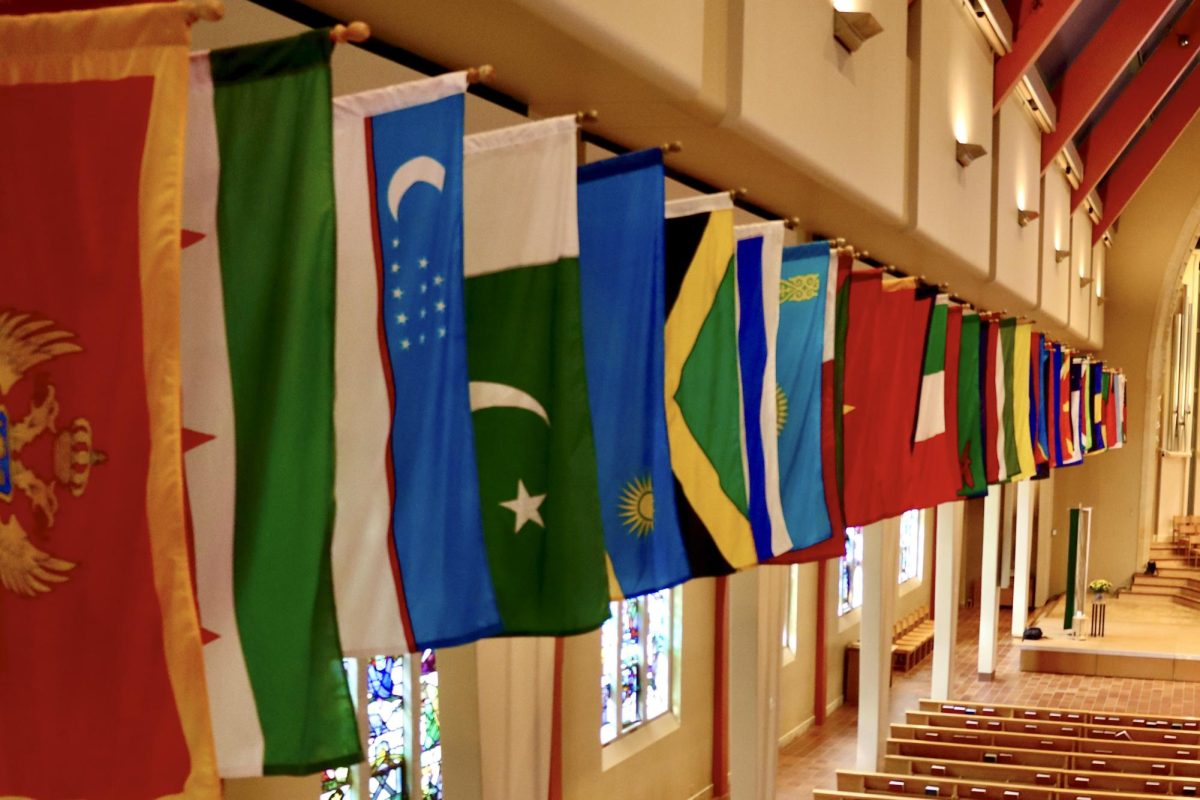The St. Olaf community is still reeling after a vandalized poster sparked a series of heated conversations this past weekend. A defaced Student Government Association (SGA) campaign poster featuring Kyle Wilmar ’17 and Héctor Poveda ’19, SGA presidential and vice-presidential hopefuls, was discovered on Saturday, March 12 in a Thorson Hall stairwell. The perpetrator had burned Poveda’s face out of the image, leaving a charred mark on the wall and the rest of the poster intact.
In response to the incident, students took to social media and other forms of online communication to speak out against discrimination and imbalances of power and privilege on campus.
The incident was not the first act of hate speech Poveda has encountered during his campaign. Poveda – an international student from Colombia – explained that he had been sitting in Fireside on the afternoon of Thursday, March 10. He was working on homework with his headphones in when he overheard a group of nearby students say they would not vote for him because he is Latino. Concerned students saw a correlation between the poster vandalism and the discriminatory remarks made about Poveda’s campaign, and took to social media to express their outrage.
That evening, civil rights activist T.R. McKenzie posted pictures of the burnt poster on Facebook and Oles began sharing the post. At 8 p.m., he and a group of student activists met in an off-campus house to discuss a course of action. Led by Cynthia Zapata ’16, Udeepta Chakravarty ’17 and McKenzie, the students began planning a protest to stand in solidarity with Poveda and to call out racism on campus. Around this time, Chakravarty sent an email to the St. Olaf Extra alias explaining the situation.
“White students have been going around saying he isn’t qualified to be vice president because of his accent and his assumed lack of English proficiency,” Chakravarty wrote. “One of his campaign posters was vandalized; they burnt out his face but not the face of his white running mate making him the specific target. This was an intentional racist hate crime.”
The email explained that although the burnt poster may be an isolated incident, it is an indicator of social attitudes on campus.
“At this institution, there is an unspoken expectation from international students and people of color to provide domestic white students a diverse experience,” Chakravarty wrote. “In fact, students of color primarily exist on campus as tokens. A Colombian international student running for an executive position in SGA, an organization that presents itself as a ‘voice for the students,’ is viewed as a threat. Students of color are usually expected to run only for executive positions in the Diversity Celebrations Committee.”
The statement reflects SGA’s lack of diversity – this year, the only non-white coordinator served as the head of the Diversity Celebrations Committee. If elected, Poveda would become the first international student ever to serve on SGA’s executive team.
Students continued the conversation on social media by replying to the St. Olaf Extra email threads, sharing the picture of the burnt poster on Facebook and making bold, anonymous statements on YikYak – some of which cried out for justice and action in light of the “racist hate crime,” while others wondered if this was an act of “impassioned vandalism.”
Saturday night, just before 9:30 p.m., Wilmar and Poveda released a statement on their Facebook campaign page, explaining: “this is a campaign about ideas and change. This shouldn’t be about race. However, the racist actions of some Ole’s [sic] have brought up an ongoing issue that affects the wellbeing of Students of Color at our campus. Something that is unacceptable. St. Olaf, we are better than this, and this must change, there is not room for discrimination on our campus.”
The St. Olaf community became restless for a response from the administration. On Sunday, March 13, just after 5:30 p.m., students and faculty received an email from Dean of Students Rosalyn Eaton-Neeb and Assistant to the President for Institutional Diversity Bruce King. The email, which served as the official statement from the college, outlined the incident and explained that “the motive for this act is unclear, but regardless of the motive, it both violates our Code of Conduct and diminishes us as a community. We are better than this.”
The statement promised that an investigation was already underway and encouraged students to continue conversation “in classrooms, residence halls, the dining hall and across our campus.”
At press time, the deans of the college had not replied to the Manitou Messenger’s request for a statement. When asked to comment, President David Anderson ’74 kept his response brief.
“I support the statement,” he said, referring to Eaton-Neeb and King’s email.
After receiving many questions from curious and concerned students, Wilmar posted on Facebook at 7:30 p.m. that he and Poveda intended to remain in the race.
“This is not the end of our campaign. It just means we have more work to do and more people to talk to,” Wilmar said. “We welcome the challenge, and we wouldn’t be doing this if we didn’t feel passionate about this community.”
At that time, over 24 hours had passed since the first report of the incident. On Yik Yak, students expressed frustrations that SGA had not yet reacted to the situation. Just after 9:00 p.m., the St. Olaf community received a statement from SGA. All nine members of the 2016 election commission, current SGA president John Bruer ’16 and vice president Will Seabrook ’16 signed the statement, along with the four candidates running for SGA executive office. Although SGA has a policy that requires them to respond to an incident such as this within twenty-four hours, the members took extra time to draft the email and made sure that the candidates approved it before sending the statement out to students and faculty.
Students tried to pinpoint the motivation for the hate speech via anonymous posts on Yik Yak, and a variety of accusations arose surrounding both the vandal and Poveda himself. Oles linked the incident to attitudes of white fragility and institutional imbalances of power, or personal vendettas and sexual assault accusations against Poveda. In an interview, Poveda expressed his frustration with becoming the target of verbal attacks on social media and anonymous platforms.
“I just can’t believe that there are some people who have this idea to say things about my personal life and about myself as an individual. I believe those people should get to know me first before they start talking about me as a person,” Poveda said. “I know I’m running for a political position at St. Olaf, but I believe I should be given an opportunity to show to the students who I am – because people change, people can be different, and what I’ve been doing this year at St. Olaf has shown the community who I am. I don’t want a few students to destroy everything I’ve been working for.”
On Monday, March 14, just before 9:00 a.m., Chakravarty cancelled the Facebook event for the protest scheduled to take place on Tuesday. Because of the previous night’s online discussion, Chakravarty and other student activists worried that if the vandal was a survivor of sexual assault, a protest would trigger them to feel unsafe. He also sent out a second email to St. Olaf Extra, acknowledging that it could not be proven that the hate speech was motivated by racism and issuing an apology for placing any students in a place of vulnerability with the proposed protest.
“Cynthia, T.R, and I issue an unconditional apology to the St. Olaf community and especially for triggering people in vulnerable positions,” Chakravarty wrote. “Our fight is against institutional racism, and we stand by our views and critiques of this institution. However, we have to honor principles of intersectionality and cannot press an agenda of justice that is uni-dimensional.”
The organizers stated clearly that they still intend to address issues of discrimination and racial injustice on campus, but that they also must respect the wellbeing of vulnerable students. Chakravarty stated that this is an issue of public safety and that St. Olaf as an institution must reevaluate avenues for discussing safety violations in all forms.
“We had to entertain the possibility that there are voices that we are trampling by putting forward this rhetoric – especially the voice of a survivor who is probably in a very vulnerable position – and we cannot advocate for that kind of justice movement, one that is not intersectional,” Chakravarty said.
Poveda has been receiving emails from current students and alumni expressing sentiments of solidarity and sharing stories of their own experiences with discrimination on campus. He has decided to remain in the race with Wilmar.
“Thankfully, I’ve been getting a lot of support from students. I’ve been extremely grateful for Emma and Sarah, the election committee, John and Will – all of them have been a great support for me and for Kyle,” Poveda said. “We’ve given our word to the St. Olaf community that we will continue running, and that’s what’s going to happen. I won’t let a couple of Oles who have decided to take time out of their lives to attack me destroy everything that we’ve been working on. And that is the most important thing.”
While professors are encouraged to talk about issues concerning race and discrimination on campus, Anderson sent an email to faculty on Tuesday, March 15 explaining that they cannot discuss specific students in regards to the recent events as the investigation continues. Although students were active on social media, limited action has been taken thus far to gather people together for face-to-face dialogues or in-person confrontations.





